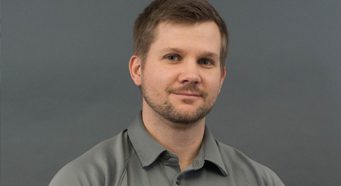The future of packaging is sustainability, according to one Clemson senior who just returned from a two-rotation co-op with Amcor, the largest flexible packaging producer in the world.

Ryan Nielson, a packaging science student from Charleston with an emphasis in materials, joined the leading industry’s research team in Neenah, WI from May to December 2019. Nielson described his responsibilities as inventing things for production.
“I guess I’d call it freedom in a cage. You have your boundaries… and you can go around and try different avenues to get to your goal,” he said. “There are certain limitations, like the machines you can use. You can make an awesome package, but if you can’t run it on existing machinery, we can’t use it. To produce [an] entire machine for one package that may not even be commercially viable would be a huge risk. A lot of companies aren’t willing to jump in and take that loss just on the chance that a package might work. We want something concrete, something more provable.”
The company has 250 sites in over 40 countries and packages everything from pharmaceutical products to food and beverages. Amcor seeks to combine its flexible technology—which uses polymers like polyethylene—with its 2025 Pledge, which promises to make all products either reusable or recyclable by the end of that year.
Nielson worked with a team of four researchers and spent three months learning about the ins and outs of flexible packaging: package types, packaging structures, and how materials within packages interact. He did so well in research that Amcor offered him a full-time position with their team in Neenah. He plans to take the job after he graduates in December since he wants to continue working in packaging design and redesign, hoping to impact the market with his innovations and urge competition in the direction of sustainability.
He realized how little he knew about flexible packaging when he got to Amcor. He likened the industry to a poker game, and success to learning how to read other players on the market. He called it “putting education into practice.”
“One thing I learned from research is that when you have a good idea, you don’t want to talk about it,” he said. “You just want to release it on the market and shock everybody and have all the other research people scrambling, like, ‘How are we going to respond to this?’”
Nielson had no prior knowledge of Amcor’s sustainability goal, but the luxury of wasteful packaging has since become a sore spot for him. He said that if consumers want to see change at the industry level, they have to “put their money where their mouth is.”
“I know people like glass. It feels nice. It feels luxurious. Imagine if you bought a cologne in a plastic bottle; you think, ‘Oh, this is cheap.’ People automatically get this perception in their mind. But I’m hoping that eventually people will shift away from that and look at a more responsible mindset, which is conserving energy and doing what’s right for the planet,” he said.
Clemson is among the few universities in the U.S. that offers a Packaging Science undergraduate degree program. The program has four emphases that students can choose from: distribution, transportation, and engineering technology; materials; food and health care packaging; and packaging design and graphics. The university also offers an accelerated five-year combined bachelor’s and master’s program, which allows undergraduates to begin their graduate coursework their senior year.
Nielson took his own advice back in July 2019, when along with two other packaging science students, Tyler Gunter and Theresa Ciccarelli, he competed in the 48-Hour RePack Student Design Competition, an event sponsored by Coca-Cola at the NextPack 2019 Summit on the Future of Packaging. The students designed a stylish, yet functional Break and Take Pack out of 100-percent recyclable Kraft paperboard.
“If we want to see the changes we want to see in the packaging industry, we need to step up and mandate and reject solutions that don’t meet our objectives,” he said.
Get in touch and we will connect you with the author or another expert.
Or email us at news@clemson.edu

